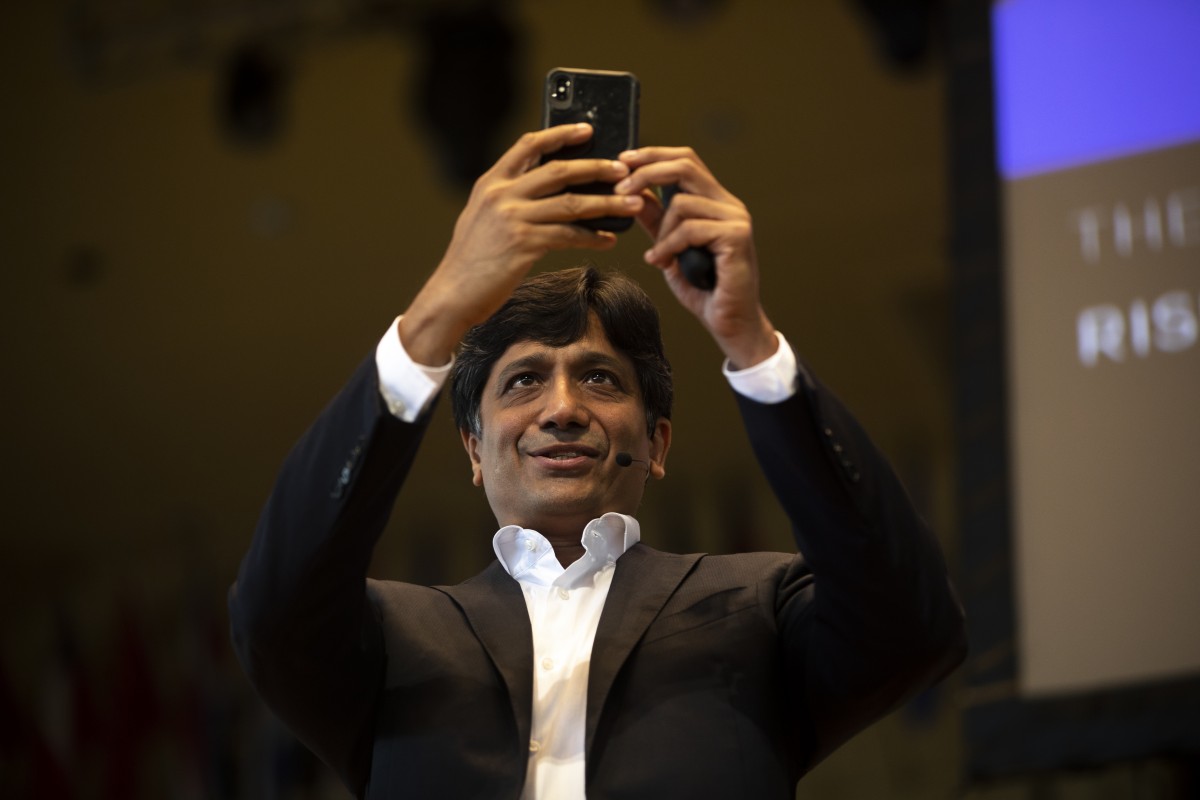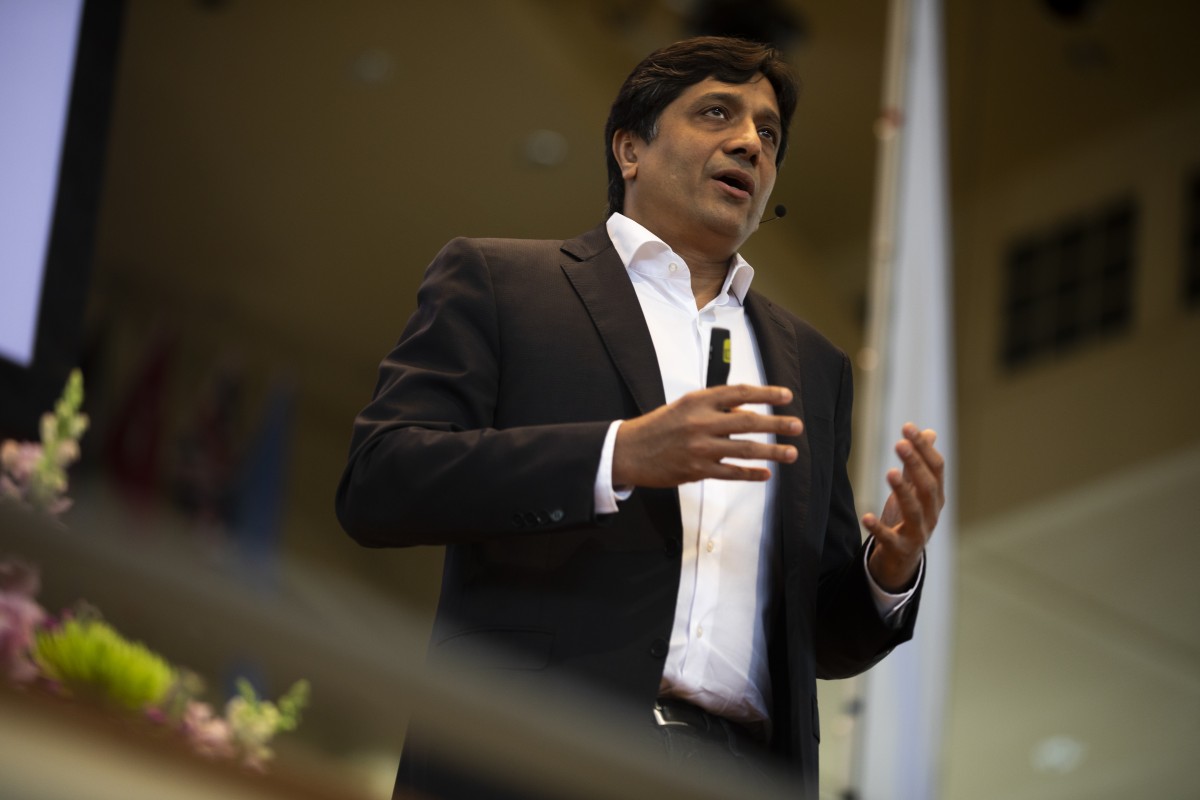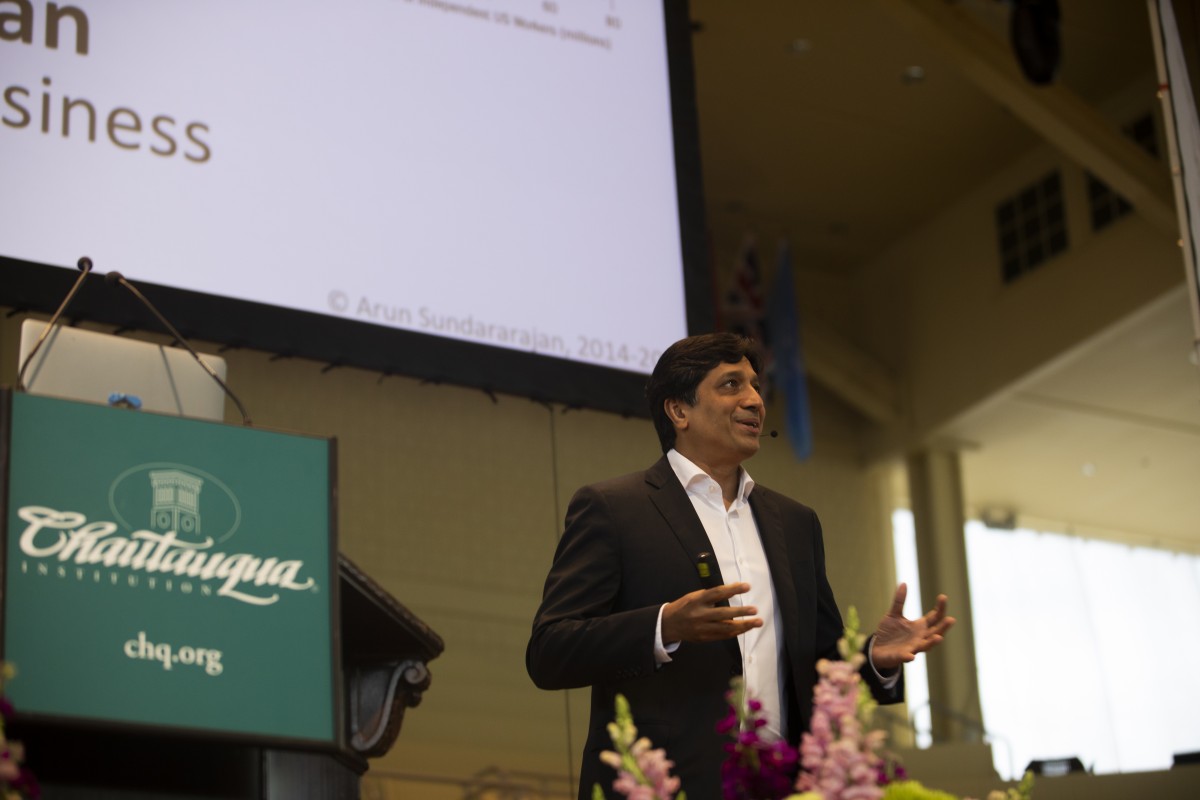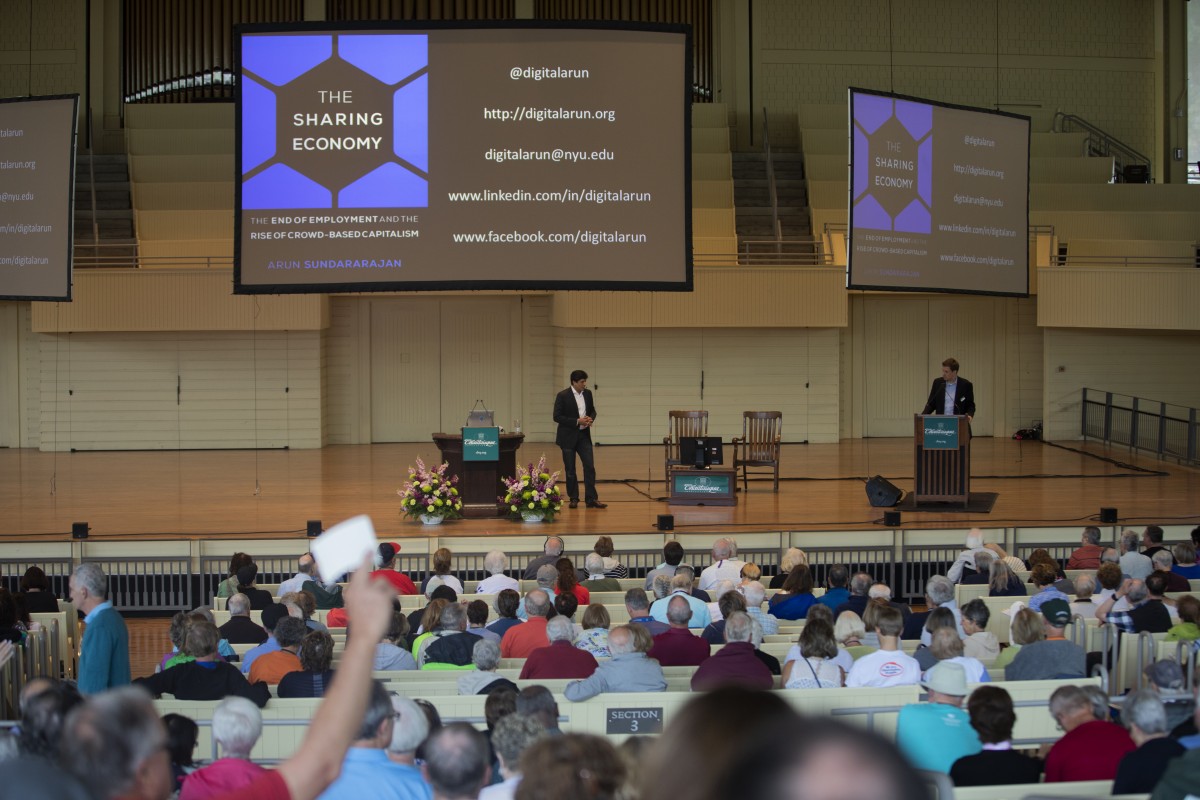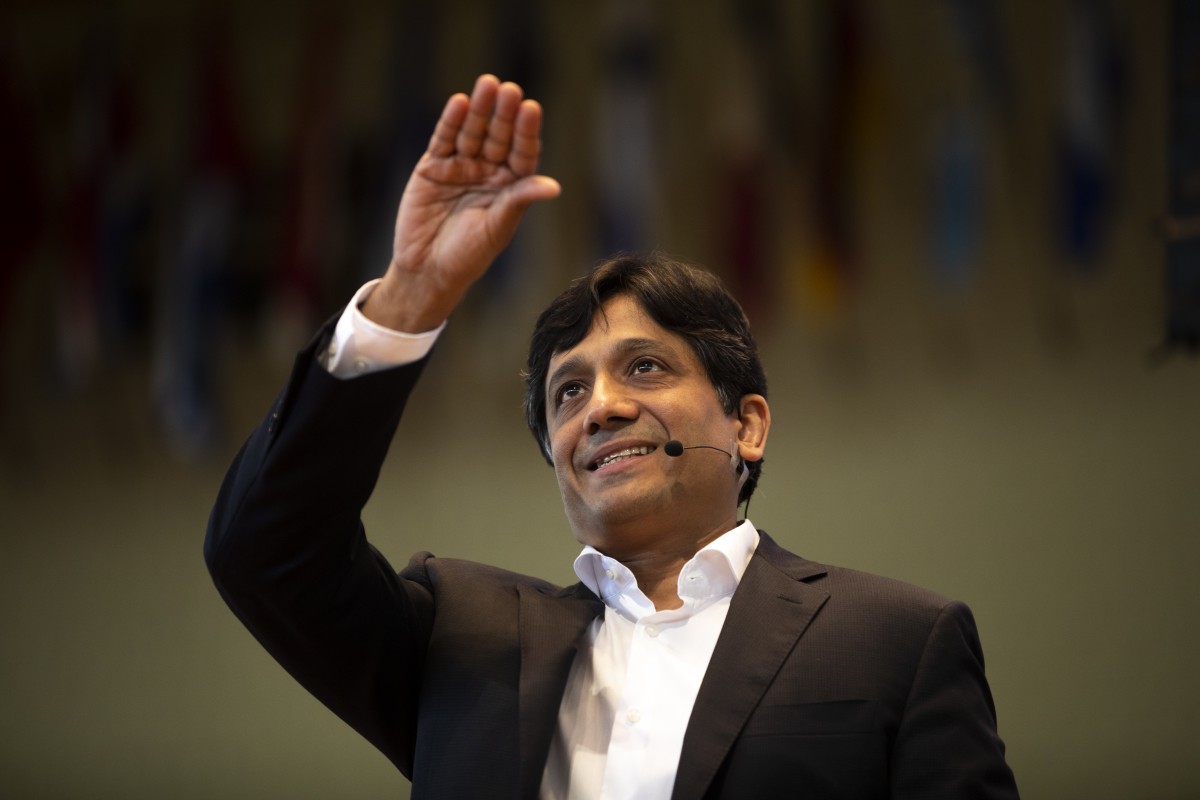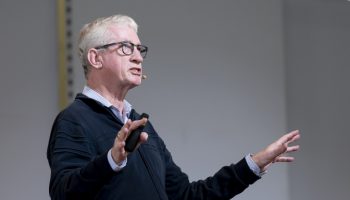Anyone who’s taken an Uber, hosted an Airbnb or sold an empty seat through BlaBlaCar has contributed to crowd-based capitalism, Arun Sundararajan said at the 10:45 a.m. morning lecture Monday, July 30, in the Amphitheater, opening Week Six, “The Changing Nature of Work.”
Sundararajan is a professor and the Robert L. and Dale Atkins Rosen Faculty Fellow at New York University’s Stern School of Business. At NYU, he researches the sharing economy and the future of work, which was the topic of his book, The Sharing Economy: The End of Employment and the Rise of Crowd-Based Capitalism.
Crowd-based capitalism is a model in which users pool ideas, content and resources on a platform where consumers can utilize those assets, search per their requirements, produce content and cultivate demand, Sundararajan said.
“YouTube is an early example of this model of crowd-based capitalism — a platform that aggregates demand, provides search and discovery, provides trustful risk management — that actually leaves the production of the stuff consumers are coming there for, or businesses are coming there for, to a distributed and heterogeneous crowd,” he said. “That’s the crowd in crowd- based capitalism.”
YouTube is now the predominant source for online video distribution and consumption, surpassing traditional, institution-based television programming with more “subscribers” than any other TV station in history, Sundararajan said.
Similarly, Airbnb, a crowd- based platform for travel accommodations, is built on this principle; the company lists individuals’ properties for rent, competing with hotels and other traditional accommodations. The company’s “distributed and heterogeneous crowd,” Sundararajan said, is out-performing most national chains.
“(Airbnb hosts) aren’t simply an on-demand labor,”he said.“They set prices, they manage inventory, they self-merchandise, … they provide customer service; they build a brand in some way — their reputation on the platform.”
Crowd-based capitalism is seeping into other industries as well: venture capitalism, grocery stores, law firms, health care, energy production and, most noticeably, ride-sharing and car rental services. BlaBlaCar, a French twist on ride-sharing apps like Uber, allows users to sell empty seats in their cars.
BlaBlaCar has created an international transportation system without investing in physical infrastructure, Sundararajan said.
“They have invested in digital infrastructure,” he said. “The key investment … is in digital trust. This is central to the shift in how we organize work.”
Twenty years ago, buying items on eBay proved risky. What if the item came damaged? What if the seller wasn’t paid? Now, however, the stakes are higher; people choose to ride with, open their homes to, or invest their money in strangers. With the increasing level of risk, Sundararajan said, comes an increasing level of trust — those leaps of trust are helping scale crowd- based capitalism.
“In many ways, we are seeing an emergence of a new infrastructure for commercial trust,” he said. “ … As the institutions of trust evolve, the way we organize economic activity evolves as well. And so, I believe that crowd-based capitalism and the distributed independent form of work will grow very rapidly as we get more confident in these digital trust infrastructures.”
Work is changing, Sundararajan said, with the shift to digital fundaments — specifically, artificial intelligence in the workplace. He stressed the historical patterns of eras threatened by machines at work; first during the Industrial Revolution, when the need for human labor decreased and people transitioned to new industries, and again in the 1970s when manufacturing in the United States plummeted.
However, for Sundararajan, this new wave of widgets is different. The shift from full-time employment to independent contract work, like that of Uber drivers and Airbnb hosts, is opening the door to an AI takeover.
“There is a redivision of what the company does and what the individual does that is quite different from the model that we got used to in the second half of the 20th century — full-time employment,” he said. “And so, while just two out of five people in the United States today earn their income from something other than a full-time job, this number is going to grow dramatically as platform-based, crowd-based capitalism becomes more popular and becomes more widespread.”
The increased need for “on-demand” labor has effects on the greater economy, he said. For freelance workers, they have to forge their own relationships with institutions typically guaranteed to full-time employers like health care and parental leave; with the employer out of the picture, the “safety net fails,” Sundararajan said.
To restore and refund the safety net, he said, public policy must establish portable benefits for independent contractors, and the United States must prepare for the rapid substitution of workers for AI, in which one in three people will experience a transition in employment.
“We are not prepared as a society for this transition. We weren’t prepared in the late 1970s. … We did not have infrastructure in place that would transfer people with dignity, and we still don’t have those systems in place today.”
-Arun Sundararajan, Robert L. and Dale Atkins Rosen Faculty Fellow, New York University Stern School of Business
He stressed the importance for educational institutions to focus on mid-career transitions rather than pre-career preparations, as well as rebuilding work communities outside of the formal, traditional workplace.
“As I look to the future, and when I think about what are the public policy challenges that we need to solve if we want to … not see the social fabric fragmented even further—it’s building a new social safety net, investing in transition education and thinking about the new place for companies and work reorganization,” Sundararajan said.
After the conclusion of Sundararajan’s lecture, chief of staff Matt Ewalt opened the Q-and-A by asking how disinformation and fake news has impacted businesses’ digital trust.
The short answer, Sundararajan said, is that it hasn’t — however, trust is still lacking.
“If you ask people about their level of trust in digital platforms, Amazon still ranks highest, Apple is OK, but trust in Facebook and Google … is extremely low,” Sundararajan said. “Now, the thing is that that doesn’t sync up with what people are actually doing. We don’t trust Google as a company, but we will share our most intimate secrets with them.”
Sundararajan believes that as digital platforms like Facebook and Google continue to grow in importance, the sites should increase their transparency and conduct “democratic reform” within themselves.
Ewalt then turned to the audience for questions. One attendee asked what the role of the government is in crowd-based capitalism.
Sundararajan said crowd-based capitalism calls for a “redivision of responsibility” between the government and the companies. He said there are aspects of the crowd-based business model that can be handled internally, like the quality of Airbnb accommodations or safety of Uber drivers and passengers, but there are other aspects that should be regulated by the government.
To close the lecture, Ewalt asked: Will the evolution of trust demand a loss of digital privacy?
Currently, Sundararajan said, people are unaware of their lack of privacy online, but he has hope in new technology that can complete safe transactions online with minimal, basic information, protecting both consumer and producer.
“The way that we have been evolving, yes, it has been in correlation with a loss of privacy and the operation of trust systems,” he said. “But if we design them right, that doesn’t have to be true.”


